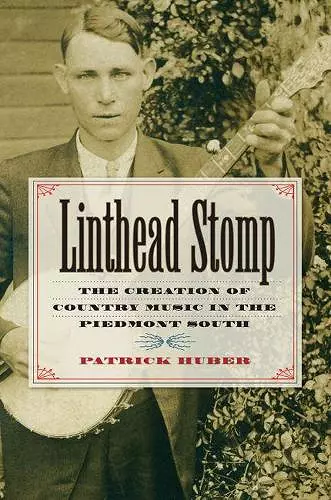Linthead Stomp
The Creation of Country Music in the Piedmont South
Format:Paperback
Publisher:The University of North Carolina Press
Published:30th Jun '10
Currently unavailable, our supplier has not provided us a restock date

Contrary to popular belief, the roots of American country music do not lie solely on southern farms or in mountain hollows. Rather, much of this music recorded before World War II emerged from the bustling cities and towns of the Piedmont South. No group contributed more to the commercialization of early country music than southern factory workers. In Linthead Stomp, Patrick Huber explores the origins and development of this music in the Piedmont's mill villages.
Huber offers vivid portraits of a colorful cast of Piedmont millhand musicians, including Fiddlin' John Carson, Charlie Poole, Dave McCarn, and the Dixon Brothers, and considers the impact that urban living, industrial work, and mass culture had on their lives and music. Drawing on a broad range of sources, including rare 78-rpm recordings and unpublished interviews, Huber reveals how the country music recorded between 1922 and 1942 was just as modern as the jazz music of the same era. Linthead Stomp celebrates the Piedmont millhand fiddlers, guitarists, and banjo pickers who combined the collective memories of the rural countryside with the upheavals of urban-industrial life to create a distinctive American music that spoke to the changing realities of the twentieth-century South.
In this groundbreaking study of the derivation of hillbilly music . . . Huber comprehensively explores the working-class origins and early development of the idiom. . . . Four colorful biographical chapters . . . form the meat of the book. . . . A fascinating glimpse into some hitherto unexplored territory.--Sing Out!
|Well-researched and truly enlightening. . . . Huber's biographical approach makes for fast-paced, enjoyable reading, and scholars of country music and southern culture will immediately recognize the importance of this work.--Technology and Culture
|A new, canny take on Old, Weird America, this colorful, contrarian book does much to dispel a spate of antediluvian tropes, musical and otherwise.--The Atlantic Monthly
|A careful exploration of the significance of regional variations in the music. . . . A remarkable and helpful summary.--The Journal of American History
|Paints a picture of a vibrant time in southern piedmont. . . . Should appeal to those interested in early country music.--Journal of Southern History
|Provides the industrial context for one of the more important centers of early country [music]. . . . Recommended for collectors of pre-1940 country music, and for readers interested in the southern industry, religion, and labor activism.--ARSC Journal
|""Huber's reverential and enlightening descriptions of country music's pioneers leave readers yearning for their actual recordings. Fortunately, an appended discography and directory of other early hillbilly musicians direct readers to more foot-stomping tunes..--Our State
|[A] splendid book . . . one of its principle achievements, due to its author's subtle but insistent writing, is to encourage the seeking out of [the performers'] work. Huber provides a very useful discography, rightly flagging up the sterling work done by labels such as Document, County and Bear Family in the dissemination of early country music recordings.--Journal of Popular Music
|Huber is to be commended for his passionate, detailed research in a rarely explored area of American music history. . . . Well-conceived narrative and vivid portrayals. . . . Anyone interested in the roots of modern American popular music will find this book to be a valuable addition to their personal library.--South Carolina Historical Magazine
|A fascinating history of Piedmont textile workers and their role in the development of country music. . . . Opens a window on a new view of country music. Recommended.--Choice
|A very well researched and written history. . . . The first book-length study of the musical culture of Southern millhands. . . . A valuable addition to America's story of Country Music.-- BC: Blogcritics Books
|With respect and passion, Huber puts . . . pioneering artists in well-deserved perspective, gracefully illuminating the birth of an American art form.--Publishers Weekly, web exclusive starred review
|Well-researched, carefully argued, and beautifully written. . . . An impressive contribution to our understanding that country music was not born in some pristine corner of America, untouched by the winds of change. . . . A splendid account of [country music's] development in the vital crucible of the Piedmont South.--American Historical Review
|Huber deftly examines a remarkable assemblage of unpublished autobiographies, interviews, and lyrics written by Piedmont textile workers.--Louisiana History
|For lovers of music and its history--especially our homegrown Southern sound--the more we know, the more we want to know. . . . An enthralling tuneful journey into the birth and influence of a heretofore undervalued contribution to the genre. Guaranteed to set readers' toes tapping and then tramping out to track down the recordings included in the Linthead Stomp discography.--Tennessee Advocate
|Based on an interdisciplinary approach that utilizes perspectives prominent in history, sociology, literary criticism, folklore, and popular music scholarship, Linthead Stomp provides a sensitive and invaluable assessment of working-class adaptation to social change.--Georgia Historical Quarterly
|Compelling. . . . An excellent first foray into an important but often overlooked chapter in the history of American popular music.--Studies in American Culture
ISBN: 9780807886779
Dimensions: 254mm x 177mm x 38mm
Weight: 525g
440 pages